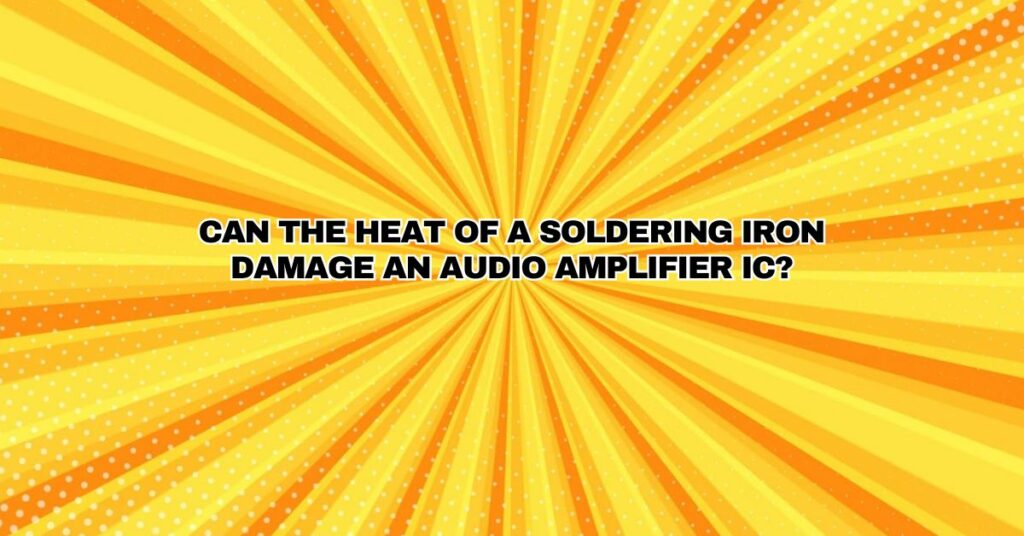Soldering is a common practice in electronics, and it is often necessary for repairs, modifications, or building audio amplifier circuits. However, when working with sensitive components like audio amplifier ICs (Integrated Circuits), it’s crucial to be cautious about the heat generated by a soldering iron. In this comprehensive article, we’ll explore the potential risks associated with soldering and the steps you can take to minimize the chances of damaging audio amplifier ICs during the soldering process.
The Vulnerability of Audio Amplifier ICs:
Audio amplifier ICs, also known as amplifier chips, are essential components in audio circuitry. They are responsible for amplifying audio signals and driving speakers, and they can be quite sensitive to heat. Here are some reasons why amplifier ICs are vulnerable to heat damage:
- Semiconductor Components: Audio amplifier ICs contain semiconductor components, such as transistors and diodes, that are sensitive to temperature. Excessive heat can alter the properties of these components, leading to performance issues or permanent damage.
- Thermal Dissipation: Many audio amplifier ICs are designed with thermal pads or heat sinks to dissipate heat efficiently. However, direct exposure to a high-temperature soldering iron can overwhelm these mechanisms, potentially causing localized overheating.
- Internal Connections: Inside the IC package, there are delicate wire bonds and connections. Prolonged exposure to high heat can weaken or damage these internal connections, affecting the IC’s functionality.
Soldering and the Risk of Heat Damage:
Soldering involves using a soldering iron to melt solder, which is a low-melting-point alloy, to create electrical connections between components. While soldering is a necessary skill in electronics, there are inherent risks when working on sensitive components like audio amplifier ICs:
- Excessive Heat: Soldering irons can generate high temperatures, with the tip of the iron reaching hundreds of degrees Celsius (or over a thousand degrees Fahrenheit). Direct contact between the hot soldering iron and the IC can cause localized overheating, potentially damaging the semiconductor components.
- Static Electricity: In addition to heat, the electrostatic discharge (ESD) produced by a soldering iron can potentially damage sensitive ICs. However, this risk is more associated with static-sensitive components, and audio amplifier ICs are typically less vulnerable to ESD.
- Solder Bridges: Inexperienced or careless soldering can result in solder bridges or short circuits between adjacent pins of an IC. This can cause electrical damage or shorts within the IC.
Minimizing the Risk of Heat Damage:
When soldering near audio amplifier ICs, it’s essential to take precautions to minimize the risk of heat damage:
- Use Heat Sinks: Heat sinks are devices designed to absorb and dissipate heat. Placing a heat sink on the body of the IC can help protect it from excessive heat during soldering. Heat sink clips or clamps can hold the heat sink securely in place.
- Keep Soldering Iron Temperature in Check: Set your soldering iron to the lowest temperature necessary to melt the solder effectively. High-temperature soldering is not typically required for standard through-hole soldering of ICs.
- Work Quickly: Minimize the duration of direct contact between the soldering iron and the IC. Work efficiently to solder the connections and remove the iron promptly.
- Flux Usage: Applying flux to the IC’s leads and solder joints can help the solder flow more easily and reduce the time the soldering iron needs to be in contact with the IC.
- Use Desoldering Braid or Pump: If you make a mistake or need to remove solder, a desoldering braid or pump can help you disengage the IC leads without excessive heat.
- Anti-Static Measures: While not primarily heat-related, using anti-static precautions can prevent damage during handling. Ensure you’re grounded and discharge any static buildup before handling the IC.
Practice and Experience:
Soldering is a skill that improves with practice and experience. If you’re new to soldering, consider practicing on scrap components before working on critical projects. Additionally, if you’re concerned about damaging an audio amplifier IC, you may want to seek professional assistance or have a more experienced individual perform the soldering.
In conclusion, while the heat of a soldering iron can potentially damage audio amplifier ICs, it’s not inevitable. By taking appropriate precautions, using heat sinks, monitoring temperature, and working efficiently, you can minimize the risk of heat-related damage during soldering. It’s essential to be cautious and patient, especially when working with sensitive components, to ensure the long-term functionality and reliability of your audio amplifier circuit.


